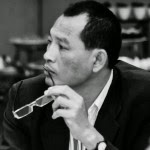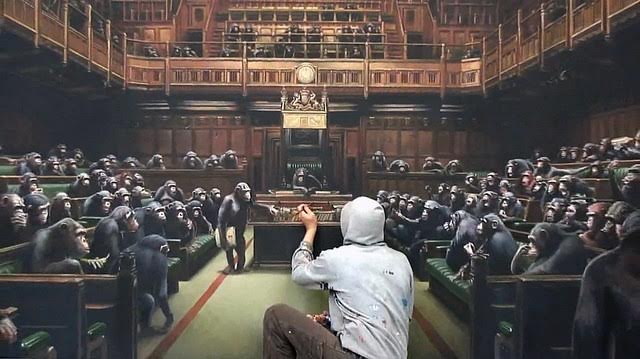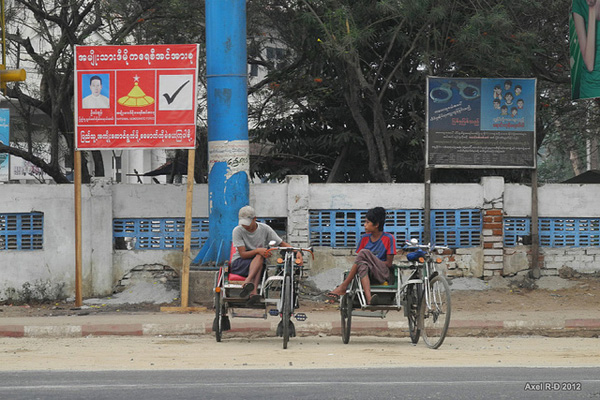The Stubborn Regime
TRANSCEND MEMBERS, 9 Nov 2015
Maung Zarni - Himal Southasian, Nepal
2015 Elections in Burma Will Be neither Historic nor Consequential
6 Nov 2015 – In mid-July on BBC, Myanmar’s Commander-in-Chief Senior-General Min Aung Hlaing said confidently that he “expects a free and fair election” sponsored by his military scheduled for November this year, and will honour the electoral results. The BBC hailed not only the general’s pro-democracy pledge, labelling this year’s polls “historic”, but also the very fact that the country’s most powerful soldier – generals in Myanmar are traditionally media-shy – sat down with the BBC for an interview.
Sitting across from a row of microphones in the BBC’s London studio, the World Service Newsday’s presenter Clare McDonnell asked me what I thought of the general’s promise and his unprecedented interview to the BBC. My answer: the generals are getting PR-wise.
The once media-shy Burmese soldiers have come of age. They have grown media-savvy and supremely confident in dealing with the outside world. Over the last four years, since US-led Western powers embraced Myanmar’s quasi-civilian government of ex-general and current president Thein Sein, Burmese generals have acted incredibly relaxed about talking to the international media, whether to regime-friendly outlets such as Singapore’s Channel News Asia or the Voice of American Burmese Service, or more professional programs like BBC’s Hard Talk.
After all, the Burmese generals have forcibly pushed through their amendment-proof constitution of 2008, which effectively elevates the military, both as an institution, and the generals, as a class, above the law. It shields the most powerful institution from any popular pressure, accords the military a veto on any policy and institutional measures, and, most importantly, legalises any future military coup deemed necessary by the commander-in-chief.
In addition, today’s Burmese generals and ex-generals have been ably assisted on public relations matters by a small but highly educated group of Burmese advisers, as well as international friends including the regime-friendly diplomats, politicians, academics and policy lobbyists. As a consequence, the generals have learned to parrot pro-democracy liberal spins, while pursuing the same old illiberal agenda dictated by the typical anti-democratic mindset instilled through military academies and decades of working in the country’s authoritarian political culture.
Upon closer look, in spite of being touted as “historic” in the Western media, the world’s capitals and investors’ circles, Myanmar’s upcoming elections lacks democratic substance.
One only needs a cursory glance at how political power is divided – or not divided – among the country’s stakeholders: non-Myanmar or non-Burman ethnic communities such as the Kachin, the Karen, the Shan, the Mon, the Rakhine [Arakanese], the Karenni, the Chin, etc, who make up roughly 30-40 percent of the total population of 51 million; and the pro-democracy Myanmar civilian communities.
As a matter of fact, Myanmar’s power set-up in 2015 resembles far more closely that of India under British colonial rule in 1918 than any political system that can be characterised as even remotely “democratic”. In his book The Future of Burma (1937), F Burton Leach, the then-chief secretary to the (colonial) Government of Burma and the political secretary to the Burma Chamber of Commerce in Rangoon, wrote: “When Mr Montague and Lord Chelmsford set about to prepare their scheme of reform in 1918, the two outstanding features of the system of Government in India which had survived all previous changes, were…first, the marked centralisation of power in the hands of the [British colonial] Government of India, and the small amount of power, either legislative, administrative or financial, possessed by the Provincial Governments, and secondly the complete independence of the [colonial] Executive from any control by the Legislature, either in the Central or in the Provincial Governments”.
Anchored in their constitution adopted in 2008, Myanmar’s military leaders introduced a new political system – “Discipline-flourishing Democracy” – after the military’s political proxy, the Union Solidarity and Democratic Party (USDP), won over 80 percent of the popular votes in a country where the military and the generals are most widely reviled. This new system devised by and for the military contains the two anti-democratic features which were the pillars of British colonial rule in India almost 100 years ago.
While ignoring the blatant disenfranchisement of nearly one million Rohingya in western Burma and possible disenfranchisement of Kachins, Karen, Shan and Rakhine in active war zones in the upcoming elections, Western governments have made an issue out of Aung San Suu Kyi, the 1990 Nobel Peace Prize winner and the most popular Burmese politician. She is being constitutionally barred from holding the highest office in the land on grounds of her two children – and late husband – being foreigners.
However, structurally speaking, the two most important issues that expose the most anti-democratic pillars of Myanmar’s “democratic system” hark back to the British colonial era political system that was deemed necessary to reform even as early as 1918: the concentration of political and administrative power in the central government vis-à-vis the non-ethnic Myanmar “peripheries” (for lack of a better term) and the constitutionally guaranteed absence of democratic accountability for those in the Executive branch, made up almost exclusively of Myanmar generals and ex-generals.
In July, the military blocvoted against a motion designed to devolve the central/national government’s existing power to appoint chief ministers of states and divisions to local legislatures, dealing a blow to any hope for an evolution of the military-controlled Parliament over time.
Furthermore, only Myanmar’s commander-in-chief is endowed with the power to appoint crucial cabinet posts such as defense, home affairs, foreign affairs and border affairs; endorse or reject any presidential and vice-presidential nominees from the elected political parties; assign military officers to man the 25 percent of parliamentary seats in all national and state/provincial legislatures; and organise a military take-over against any sitting parliamentary government.
The fact that any constitutional amendment requires more than 75 percent of the approving votes gives the commander-in-chief veto power over virtually all aspects of Myanmar’s political system. The 25 percent of military representatives are organised as a brigade within the parliament. Unfailingly, the military representatives vote as a bloc, whatever the issue, as ordered from the Office of the Commander-in-Chief.
Aside from the categorically anti-democratic constitutional arrangements of political and administrative power, there is also a profoundly disturbing issue, namely the military’s capture of what academics call the State, that is, the governmental/administrative ethos, culture and practices, institutions and personnel.
During the past 53 years (of which 49 were direct military rule and four quasi-civilian), the Burmese generals have staffed virtually all strategic administrative positions at both state and national/central government levels with military personnel. Literally thousands upon thousands of bureaucrats are either in-service military officers or military veterans.
Some token civilian administrative heads and advisors notwithstanding, all important decisions are taken by the militarised-bureaucrats. The buck stops at the military’s desk. The futility of ceasefire negotiations in the face of the Burmese military’s push for the surrender of the ethnic armed resistance organisations is a case in point.
To ensure there is no split in culture, ethos and loyalty in the country’s vast security sector, the military has infused its loyal officers into police and intelligence services. Further, the military has organised a vast nationwide circle of veterans whose loyalty and support can be counted upon in terms of popular mobilisation for the military’s strategic ends. This is in addition to the military’s ultimate control of the ruling Union Solidarity and Development Party (USDP).
With these kind of British colonial-style safeguards for the ruling military’s vested interests, both political and economic, there is little wonder that the commander-in-chief had no problem making the promise of respecting the outcome of the November elections.
Economically, since the early 1950s, when the country’s civil war with multiple fronts increased the central role of the military in Burma’s national politics, the generals have built up an economic base for the military as an institution. To date, virtually all important sectors of Burma’s national economy, including an informal economy, is tied to military’s interests, and is under either the direct or indirect influence of the Ministry of Defence.
The military’s conglomerates, and their associates run vast economic enterprises and mega-development projects. Not only are the Burmese generals and their base, the military, above the law and beyond accountability, but their conglomerates oppose any external audit and laugh at any foreign ideas such as “corporate social responsibility”.
To be sure, transition from 50 years of military rule to a representative system of government is going to take years and monumental efforts – even in cases where the military leaders are aware of their own failures at nation-building and as policy makers.
In the case of the Burmese military leadership and the military, this transition from dictatorship to democracy is made incomparably harder. For the military has internalised the self-serving justification that without its strong hand – that is, concentration of power and control in the military and its loyalists – the multi-ethnic country is going to disintegrate.
No number of election cycles nor any amount of election monitoring will make a dent in the military’s structures of power. Seen in this light, Burma’s upcoming elections will change nothing in terms of power and control.
__________________________________
Dr. Maung Zarni is a Burmese activist blogger, Associate Fellow at the University of Malaya, a member of the TRANSCEND Network for Peace, Development and Environment, founder and director of the Free Burma Coalition (1995-2004), a visiting fellow (2011-13) at the Civil Society and Human Security Research Unit, London School of Economics, and a nonresident scholar with the Sleuk Rith Institute in Cambodia. His forthcoming book on Burma will be published by Yale University Press. He was educated in the US where he lived and worked for 17 years. Visit his website http://www.maungzarni.net
To read more on Burma please visit the Democratic Voice of Burma‘s website.
DISCLAIMER: The statements, views and opinions expressed in pieces republished here are solely those of the authors and do not necessarily represent those of TMS. In accordance with title 17 U.S.C. section 107, this material is distributed without profit to those who have expressed a prior interest in receiving the included information for research and educational purposes. TMS has no affiliation whatsoever with the originator of this article nor is TMS endorsed or sponsored by the originator. “GO TO ORIGINAL” links are provided as a convenience to our readers and allow for verification of authenticity. However, as originating pages are often updated by their originating host sites, the versions posted may not match the versions our readers view when clicking the “GO TO ORIGINAL” links. This site contains copyrighted material the use of which has not always been specifically authorized by the copyright owner. We are making such material available in our efforts to advance understanding of environmental, political, human rights, economic, democracy, scientific, and social justice issues, etc. We believe this constitutes a ‘fair use’ of any such copyrighted material as provided for in section 107 of the US Copyright Law. In accordance with Title 17 U.S.C. Section 107, the material on this site is distributed without profit to those who have expressed a prior interest in receiving the included information for research and educational purposes. For more information go to: http://www.law.cornell.edu/uscode/17/107.shtml. If you wish to use copyrighted material from this site for purposes of your own that go beyond ‘fair use’, you must obtain permission from the copyright owner.


